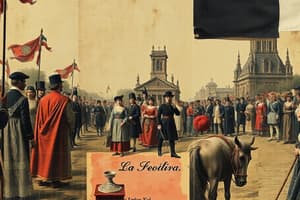Podcast
Questions and Answers
Which of the following best describes the composition of the Third Estate in pre-revolutionary France?
Which of the following best describes the composition of the Third Estate in pre-revolutionary France?
- Represented a small group of wealthy merchants and landowners.
- Primarily consisted of the nobility and high-ranking government officials.
- Exclusively comprised of members of the clergy and religious figures.
- Mainly included peasants, commoners, and the bourgeoisie. (correct)
What was the main purpose of the Estates General when it was convened by King Louis XVI in 1789?
What was the main purpose of the Estates General when it was convened by King Louis XVI in 1789?
- To declare war on neighboring countries and expand French territory.
- To serve as a purely ceremonial body with no real political power.
- To celebrate the King's birthday with representatives from each estate.
- To address the economic crisis and discuss potential reforms. (correct)
Which of the following factors did not directly contribute to the outbreak of the French Revolution?
Which of the following factors did not directly contribute to the outbreak of the French Revolution?
- Economic hardships and financial burdens on the common people.
- The successful implementation of fair taxation policies by the monarchy. (correct)
- The influence of Enlightenment ideas promoting liberty and equality.
- Widespread social inequality and resentment towards the privileged classes.
What was the immediate consequence of the execution of King Louis XVI during the French Revolution?
What was the immediate consequence of the execution of King Louis XVI during the French Revolution?
How did the living conditions in pre-revolutionary France differ between the nobility and the common people?
How did the living conditions in pre-revolutionary France differ between the nobility and the common people?
What was the main goal of the Jacobins during the Reign of Terror?
What was the main goal of the Jacobins during the Reign of Terror?
How did they French Revolution impact the rest of the world?
How did they French Revolution impact the rest of the world?
What lasting principles emerged from the French Revolution that continue to be central to France's national identity?
What lasting principles emerged from the French Revolution that continue to be central to France's national identity?
Flashcards
Three Estates
Three Estates
The three social groups in France: clergy, nobility, commoners.
Taille
Taille
A land tax imposed on the common people in France.
Estates General
Estates General
A representative assembly of all three estates in France.
Reign of Terror
Reign of Terror
Signup and view all the flashcards
Execution of King Louis XVI
Execution of King Louis XVI
Signup and view all the flashcards
Living Conditions Before Revolution
Living Conditions Before Revolution
Signup and view all the flashcards
Consequences of the Revolution
Consequences of the Revolution
Signup and view all the flashcards
Principles of the Revolution
Principles of the Revolution
Signup and view all the flashcards
Study Notes
The French Revolution: Causes, Events, and Consequences
- The French Revolution was a period of significant political and social change in France, marked by challenges to the existing order.
The Three Estates
- French society was divided into three estates:
- The First Estate: Clergy (Church members)
- The Second Estate: Nobility
- The Third Estate: Peasants and commoners (vast majority)
Taxation and Unrest
- The French people faced heavy taxation, particularly the land tax (Taille).
- This led to growing dissatisfaction and demands for reform among commoners.
The Estates General
- The Estates General was a representative body for all three estates.
- It was convened by King Louis XVI in 1789 to address the economic crisis.
- It's a group of representatives from all different French estates.
Causes of the French Revolution
- Bad harvests and rising prices: Led to widespread hardship.
- Desire for social change: The Third Estate demanded equality and an end to the privileges of the nobility and clergy.
Events of the French Revolution
- Execution of King Louis XVI: Executed by the National Assembly in 1793 for treason.
The Reign of Terror
- The Jacobins seized power during the National Convention.
- A period of violence and persecution against those who opposed the Revolution.
Living Conditions Before the Revolution
- Significant disparities between the estates.
- Nobility and clergy enjoyed privileges and exemptions from taxation.
- Common people faced heavy financial burdens and social inequality.
Consequences of the Revolution
- Rise of Napoleon Bonaparte.
- Establishment of a new order in France, abolishing the monarchy.
- Principles of liberty, equality, and fraternity became central to French identity.
- Inspired movements for change across the world.
Studying That Suits You
Use AI to generate personalized quizzes and flashcards to suit your learning preferences.




